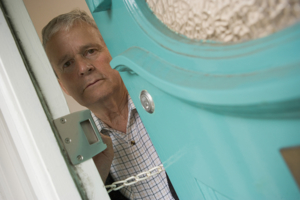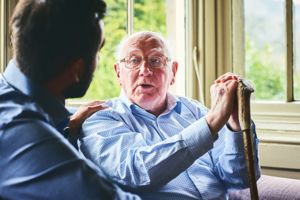The Power of Positive Thinking: How to Overcome Caregiver Stress

Responsive Home Care is the ideal solution to achieve a healthier life balance – both for family caregivers and the older adults in their care.
Our facial expressions reveal so much to people around us, and when you are experiencing an abnormal degree of stress, well-meaning friends will certainly notice it, perhaps encouraging you to essentially, “Cheer up, buttercup!” In reality, of course, it requires a lot more than a few words to turn our mood around and to help us overcome caregiver stress.
Recent research supports the idea of positive thinking as a method to decrease levels of depression and anxiety which occur when we are flooded with stress – something essential for busy family caregivers to take to heart to reduce the possibility for burnout.
Judith Moskowitz, lead psychologist in the research project who subsequently created a course to overcome the unpredictable manner of emotions so frequent in individuals providing care for a senior loved one, says, “We’re not saying don’t be sad or upset about what’s going on. But we know people can experience positive emotions alongside that negative emotion, and that positive emotion can help them cope better.”
The primary techniques in her program include the following:
• Keep a journal of things for which you’re grateful – including the small things.
• Identify at least one uplifting event every single day.
• Talk about this occurrence with your family on social networks.
• Establish one new goal every day, and keep track of your progress in achieving it.
• Identify one of your talents and contemplate how you’re making use of that skill.
• Undertake one daily simple act of kindness for another.
• Think about a negative event, and then discover a way to view it in a positive light.
• Practice focused breathing and mindfulness to bring back a sense of calm.
For those of you providing care for a loved one with dementia, the need to concentrate on positives can be much more vital to overall wellbeing. Family caregivers who participated in a recent five-week study where the effectiveness of these coping skills was evaluated documented a decrease in depression scores of 16%, and a decrease in anxiety of 14%.
In addition to the strategies above, it is necessary for family caregivers to stop isolating themselves and trying to manage their caregiving duties solo, which can very quickly bring on caregiver burnout along with other significant health problems. Partnering with an established Sunrise elderly care, like Responsive Home Care, is the ideal solution to help in achieving a healthier life balance – both for family caregivers and the older adults in their care.
Life is indeed stressful, but we are ready to help! Contact Responsive Home Care, the leader in home health care in Pembroke Pines, and let us help you overcome caregiver stress so that you can concentrate on self-care and good quality time with those you love.




